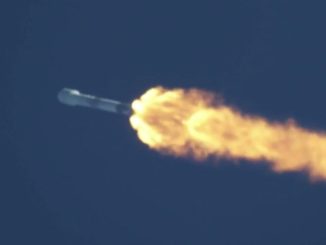SpaceX is preparing for the launch of its Falcon 9 rocket, carrying 24 satellites as part of Amazon’s Project Kuiper broadband internet constellation. Following over a week of weather-related delays, the launch is scheduled for October 12, 2025, at 8:08 p.m. EDT (0008 UTC) from Space Launch Complex 40 at Cape Canaveral Space Force Station.
The mission, designated Kuiper Falcon 03 (KF-03), faced multiple postponements due to adverse weather conditions both in the area and offshore. On Sunday, the 45th Weather Squadron provided a positive forecast, indicating a 95 percent chance of favorable weather during the launch window. Nevertheless, they cautioned about a “moderate” risk for conditions affecting the booster recovery area.
Weather Conditions and Launch Preparations
According to the launch weather officers, winds are expected to shift gradually from the northwest to the north, resulting in mostly clear skies. They noted that this weather pattern should remain consistent through the backup launch window scheduled for Tuesday evening. The primary concern for both launch days is a slight risk of a violation of the Cumulus Cloud Rule.
Recovery conditions for the Falcon 9 booster will be monitored closely due to elevated wind and sea conditions linked to a nearby low-pressure system. SpaceX plans to utilize the Falcon 9 first stage booster B1091 for this mission, marking its second flight after previously launching the KF-02 mission. Following liftoff, the booster is expected to perform an autonomous landing on the drone ship Just Read the Instructions, located at sea, approximately eight minutes after launch.
Impact on Satellite Constellation
If successful, this launch will represent the 138th landing on the drone ship and the 517th booster landing overall for SpaceX. The deployment of the Project Kuiper satellites will commence more than 56 minutes post-launch and is projected to conclude within eight minutes, bringing the total number of satellites in the constellation to 153 in low Earth orbit.
This mission marks the sixth overall effort to support the Kuiper constellation, following three launches conducted by United Launch Alliance on Atlas 5 rockets and two earlier launches on Falcon 9 rockets. The addition of these satellites is a significant step in expanding Amazon’s broadband capabilities through its Project Kuiper initiative.
As the countdown to launch approaches, SpaceX and Amazon are poised to make advancements in global internet access, particularly in underserved regions. Live coverage will be available, starting about an hour before the scheduled liftoff.
